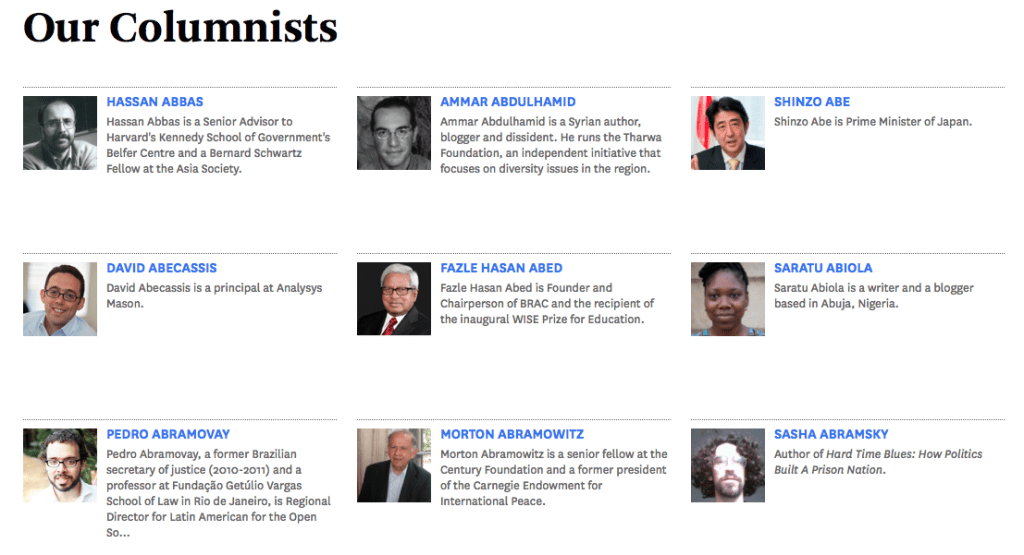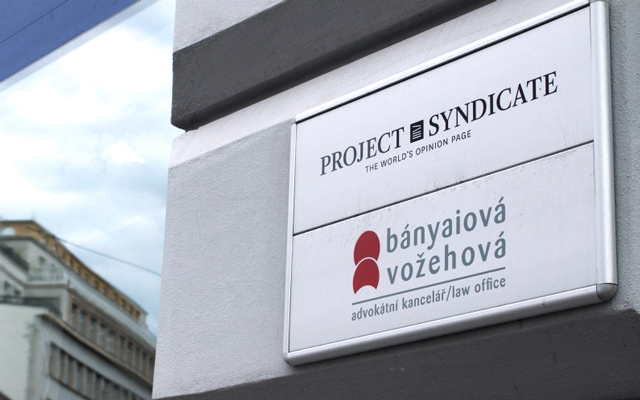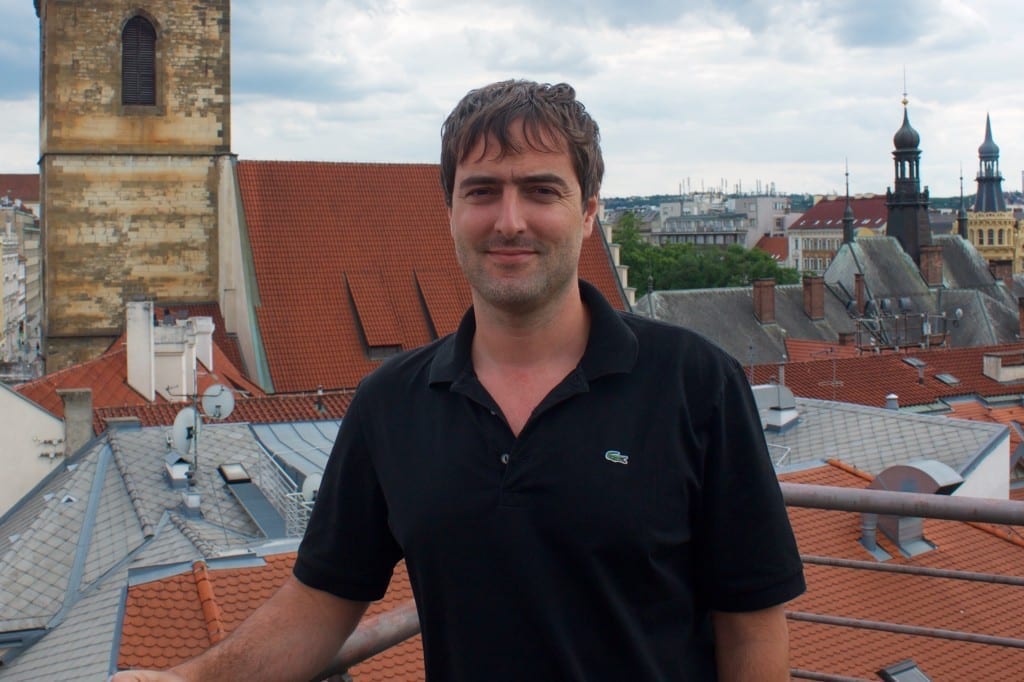Since 1994, Project Syndicate has provided readers with original, engaging, and thought-provoking commentaries by those who are shaping the world’s economics, politics, science, and culture. The Columnist talked to Nicolas Chatara-Morse, Chief Executive Officer of Project Syndicate to find out more about the organization, media and the future.
What is the purpose of Project Syndicate and what are you fighting for?
The goal of Project Syndicate is to ensure that publishers in all countries, regardless of their financial and journalistic resources, can offer their readers original, engaging, and thought-provoking analysis on global issues that matter to them. Often operating in challenging political environments, many of our publications struggle to provide differing viewpoints. We help them bring credible voices and views to their readers through commentaries by the world’s leading economists, statesmen, academics, and activists. This provides all people, regardless of where they live, what language they speak, or their income level, the opportunity to participate in important discussions involving politics, economics, climate change, innovation, education, and human rights.

Some of the global leaders and thinkers who are shaping the world’s economics, politics, science, and culture, offer their perspectives at Project Syndicate (Source: Project Syndicate)
What led you to join the organisation?
In two words: Content and Mission. The opportunity to work in an organization that focuses on producing, distributing, and translating commentaries written by today’s leading minds was very attractive to me. What could be better than surrounding myself with a broad variety of the most cutting-edge, expert opinion and analysis? However, the mission of Project Syndicate was really the most attractive part of the organisation to me. Ensuring that as many people around the world as possible can learn from, discuss, and debate the ideas and thoughts of some of today’s most accomplished minds is something that I believe can have a positive impact. Nothing is more powerful than information, and nothing is more dangerous than mis-information. Project Syndicate deals in opinion commentary only. An opinion is one author’s beliefs, thesis, or analysis of a particular idea based on facts or their personal experience. It is not meant to be read as truth, but rather as a catalyst for further thought. You either agree or disagree with the author, and in the process something might motivate you to delve further into an issue. Enabling that level of thought around the globe is something I am proud of.
Could you share an encounter to give us a glimpse into what you do on a daily basis?
A typical day for me is an enjoyable mix of ensuring that our commentaries are distributed on time and to as many member publications as possible, managing relationships with publications in both the developed and developing world, overseeing the financials, brainstorming new digital and business-development initiatives, discussing potential partnerships with like-minded organisations and foundations, and consuming a lot of coffee. Although Project Syndicate’s reach spans 77% of the globe, the team in Prague is a small group of incredibly intelligent, passionate, and committed people who believe in the good work they are doing. It’s truly a pleasure to come to work every day.
Project Syndicate was founded towards the end of the cold war. Now a new chill seems to be descending upon us with Ukraine being one of the more visible front lines, how will your organisation play a role?
Project Syndicate was established in the early 1990s as an initiative to help newly independent media in post-communist Central and Eastern Europe expose their readers to different ideas and views. We quickly expanded to Western Europe, Africa, Asia, and the Americas maintaining our original headquarters in Prague, Czech Republic. For this reason, the deteriorating political and economic situation in Ukraine, and by extension Eastern Europe, hits particularly close to home for us.
We have published and syndicated commentaries from a number of regional and global experts on this complex topic. These commentaries come from those with competing views and are representative of how dividing the situation in Ukraine can be. Yulia Tymoshenko, Nina Khrushcheva, Western European and US policymakers, economists both for and against economic sanctions on Russia have all contributed. We hope that these commentaries help our member publications encourage serious debate that lead to lasting solutions.
From the operational side, we have strengthened our partnerships with the most credible media in Eastern Europe by supporting financially constrained, but well-respected and trusted publications. Recently, we have also helped journalists from Eastern Europe access grants that have allowed them to travel to Eastern Ukraine and cover the story personally.
The loss of independence in media is increasing, news media outlets are being bought out by large firms with no experience in journalism; governments are getting into the business of shaping public opinions through their own news network, where does Project Syndicate fit in this new landscape?
We’re finding that our operating model continues to benefit news outlets and their readers, especially in this climate. Through our model, news organisations in developed countries pay market rate for our commentaries. This then allows us to offer commentaries to news media in the developing world for free or subsidised rates.
During times of declining media independence, our free and subsidised partnerships take on a heightened role. More and more, we are electing to extend our support to media that are under threat. Some of our partner publications have been the targets of journalist arrests and operation-ending government fines. Even in many developed nations we are seeing media manipulation from governments and corporations that severely impact what they are allowed to publish. This strengthens our commitment to supporting independent media and makes us feel like the work we do is even more important.
Apple has just announced that it is getting into the news business and Facebook has a new feature for media companies, how will technology play a role in your organisation?
Technology will continue to enable Project Syndicate commentaries to reach more and more readers around the world. We currently have over 200,000 fans on Facebook and over 100,000 followers on Twitter, and the viral nature of social media has created a relatively new distribution channel that reaches tens of millions of readers around the world. With Apple and Facebook positioning themselves as publishing platforms, Project Syndicate will continue to embrace new digital channels and use them as much as we can to distribute the thoughts and ideas of our authors.
Continuing the discussion about disruption, how will Project Syndicate’s business model evolve to remain sustainable?
As media finds itself increasingly under financial and political threat, Project Syndicate must remain adaptive and flexible. One thing that we have working for us is the quality of our commentaries. We believe that opinion from influential experts will always be in demand and sought after. For that reason, we remain committed to our mission of ensuring these opinions reach as many readers as possible. Having said that, we have adjusted our strategy in several ways. For one, we have diversified the types of publications we work with and have increasingly reached out to NGOs, think tanks, financial institutions, digital-only publishers and other such organizations that share our mission and wish to utilize our commentaries. This serves the dual purpose of helping us remain financially viable while at the same time increasing the reach of our commentaries. From a product side, we have also been putting increased resources into developing new digital products. Diversifying what we are able to offer our readers and partners allows us to change with the market and the ways people consume information.
From where you are, being able to see the trends in terms of thinking, what inspires you and what worries you?
I’m inspired by two clear trends that I see emerging in global conversations: the need for sustainable development, and the need to address financial inequality. Project Syndicate has dedicated huge resources to fostering a debate on both issues. I’m worried by the seemingly delicate nature of the world’s recovery from the financial crisis.
If you could organise a discussion with G7 world leaders about climate change, which expert(s) will you put before them to convince them about the urgency for change?
The issue of climate change is too big and too complex for a group of experts to handle in a single conversation. Like Project Syndicate, I believe that to fully understand any issue one needs to have as many qualified and varied viewpoints at the table as possible.
At the end of your term, how would you like to describe your tenure? Please use only 3 words and share with us why?
Growth. Value. Sustainability.
When I started with Project Syndicate in 2000, we had roughly 45 member publications in 30 countries. Today, we have nearly 500 in over 150. I would like to think that I’ve had a part in helping us grow over the years.
Likewise, I would like to believe that the value Project Syndicate provides to its member publications, and readers around the world has increased. Now, Project Syndicate distributes nearly 100 commentaries per month and they are more accessible than ever.
And finally, the challenge of leading a not-for-profit publisher to financial sustainability in these difficult times is more pronounced than ever. I would like to think that, when I leave, Project Syndicate is financially sustainable, so that the good work we do may continue.
Thank you very much for joining us.
This interview was conducted for The Columnist, a newsletter by Consulus that offers ideas on business, design and world affairs. The views expressed in this article are those of the interviewee and do not necessarily reflect the views of Consulus.





